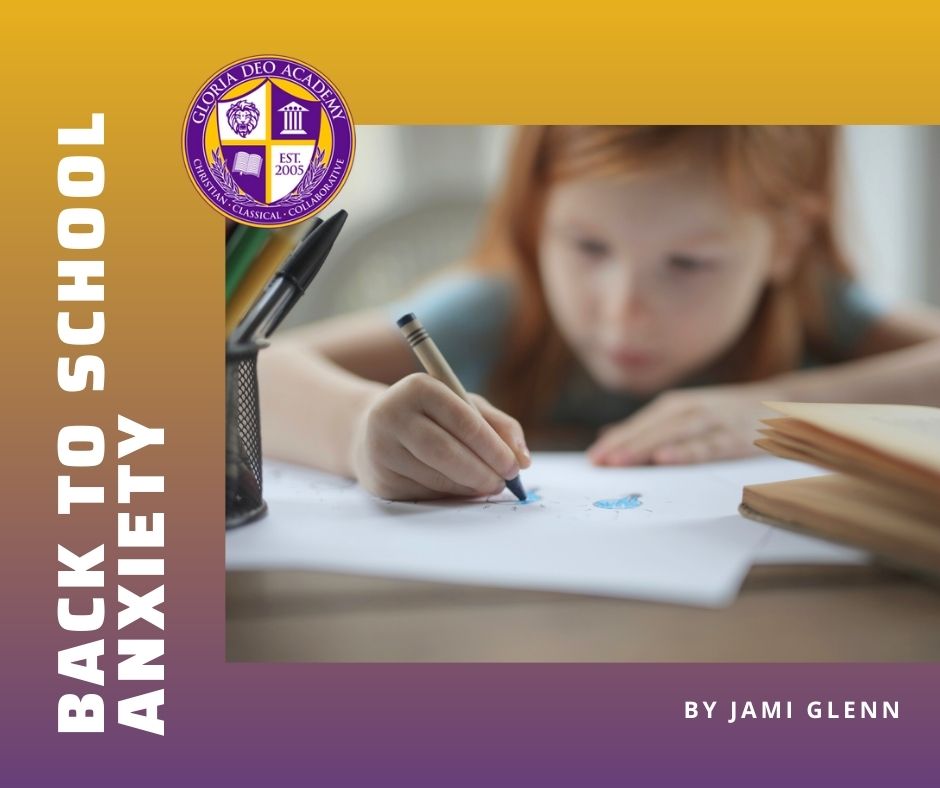Back to School Anxieties
As we gear back up for school, you may notice some behavioral changes in your child. Back to school anxieties are normal. He might be extra clingy when you leave to run an errand. She might revert back to using a whiny voice that she hasn’t used in years. Your child, who has attended school for years without any issues, may begin to feel nervous or anxious about returning to school- asking many questions about the upcoming school year. Or maybe you have a young one who is brand new to school or has had some hard times with drop-off in the past and you’re already bracing yourself for the tears each morning.
Whatever the case may be, if your child is acting a bit “off” lately, just know that it’s most likely due to the upcoming school year and future changes in their routine.
Due to social distancing since the spring, many of you have spent much more time with your children than usual. Your kiddo has gotten used to the idea that you (or another trusted caregiver) is always around. Even though they rolled their eyes at you every time you asked if they wanted to play Monopoly or they’ve constantly begged for friends to come over, your child has gotten used to being around you.
The world around our children has become chaotic and unknown…. Constantly shifting and changing due to the pandemic. In a child’s brain, words like chaotic and changing are synonymous with unsafe. When a child senses that he may not be safe, he will stay close to what he considers to be a safe person. Think of it like you’re his “home base”- he knows he’s safe with you. This can be a sign of a good, healthy attachment and it has served him well during this pandemic.
Now that we are gearing up to return to school, his anxiety might heighten because his sense of safety has been with you. Although this might be frustrating for you as the caregiver- especially if you feel like it’s out of left field or that your kiddo should be “past this stage,” it’s very typical for kids to regress when stress-levels are higher.
Whatever your child’s age, separation anxiety can be a real and typical response to the pandemic.
Below are a few tips to help your student cope with any separation anxieties or back-to-school anxieties that may arise in the next couple of weeks. This is not an exhaustive list, but these are my go-tos as a school counselor. I suggest trying one tip and then adding in another one if you think your kiddo could use some more support.
TIPS FOR HELPING KIDS WITH BACK-TO-SCHOOL ANXIETY
- Take a deep breath. (I’m talking to you, caregivers. ?) Coaching a kid through anxiety can feel like a long and curvy journey that you didn’t sign up for. You can do this! Breathing deeply and counting to ten can be very helpful when having these conversations with your child.
- Listen. Ask your child questions about how he is feeling about the upcoming school year. What questions does he have? It’s best to be honest when answering. If you don’t know the answer, say “I’m not sure about that, but I can do my best to find out.” If you do know the answer, just tell him the answer in a matter of fact way, and try not to give your opinion on the matter. For example, if your kiddo asks if he will have to wear a face mask to school, answer him honestly, “I’m not sure yet, but as soon as the administrators let us know, I will tell you.”
Conversation tip… kids usually talk more openly when they are doing something with their hands (like coloring, playing with playdough or building with Legos) or when they don’t have to make eye contact with the adult (when you are saying good night and their room is darker, while riding in the car, etc.)If you find you’re getting a lot of shoulder shrugs or “I dunnos…” I suggest trying one of the above ideas and see if it can help your child feel comfortable opening up.
- Use a social story. A social story is basically a counseling term for ‘talking your kid through a future experience’. So, if your child is super anxious about returning to school, sit down with her and tell her exactly what will happen. It might sound something like this:“On the first day of school, I will take you to the new Golden building. When we get to the building, we will go through car drop off just like normal. You will grab your bags, and there will probably be a teacher there to help you get your bags out just like last year. Then, you will go inside and have Opening Ceremony….” (talk about the rest of the day with as many details as you can)… “then at 3:05, Dad will be there to pick you up!”
A social story works really well if you can continue to add onto it and talk about it each day leading up to the big event (first day of school). So, by the time the first day of school rolls around, your child feels confident about what to expect because you both have gone over it several times. You can also add in questions as you go along.
For example, “who might you sit by at Opening Ceremony?” or “What would you like me to pack in your lunchbox on the first day?” Questions like that give your child a sense of control and agency on her day, which helps build her confidence that she can, indeed, do this hard thing.
- Pick out a word, phrase or Bible scripture that he can memorize before the first day of school. I totally geek out on all things brain related because our brain really is an amazing organ and we keep learning more things about it every single day! One amazing thing that we know about the brain is that neurons that wire together, fire together.What that means is that we have the power to change habitual patterns of thinking that we might have. One of the most powerful ways to change these patterns of thought is to choose a word or phrase to help direct our thinking.
The more times we say the new word or phrase, the stronger that neural pathway gets. For example, let’s say that a student feels like he is poor at math. He might say things like, “I’m not good with numbers. They just don’t make sense to me.” That is just a habitual pattern that his brain has come up with….
The neurons on that neural pathway are very strong. To change that neural pathway, he can start saying, “I work hard at math and even though numbers don’t come easy to me, I practice and become a better mathematician each day.” The more he says those words, the stronger that neural pathway becomes and before we know it, he’s feeling more confident in himself as a mathematician.
It can work the same way with anxiety. For example, when my daughters are feeling stressed, a word that they use over and over is Breathe. Any time they get stressed or overwhelmed, they both know to quietly say the word Breathe to remind them to calm down and take a deep breath.
One of my favorite scriptures is “Be still and know that I am God.” I have quietly whispered this scripture probably a thousand times during this pandemic and it’s been super helpful. Ask your child what he feels like would be a helpful word/phrase/poem/scripture to memorize during this time and help him memorize it.
Starting today, any time he gets anxious about school starting back up, remind him to say his word/phrase/scripture a couple of times so that it’s a habit by the time the first day comes.
- Remind your child that her behavior is totally normal during a time like this. Sometimes, a child might feel anxious about returning to school and then feel anxious about feeling anxious because she thinks she’s too old for that or she feels like she’ll be the only one in her friend group feeling these feelings. Remind her that feeling anxiety about being away from her family and going to school is totally normal.
- Pray. Pray for you child and with your child. Be honest with God about your child’s feelings. A prayer like, “God, (child’s name) is having a hard time right now. He’s nervous about going back to school. We know that You are a God who cares for Your kids so please help him to feel Your presence with him at school. Help him to feel Your love and my love throughout the day…” can be such a powerful prayer for a child to hear.
I hope that these tips are helpful to you and your child! Please let me know if you need anything or, if your child is having a particularly difficult and anxious time with the return of school, please email me and I can give you some more ideas. We want to make the first day of school a win for all kids and families so do not hesitate to contact me with any questions or concerns.
Cheering You On,
Jami Glenn
GDA School Counselor
jglenn@gloriadeoacademy.org
For more reading about anxiety free kids check out this book!





